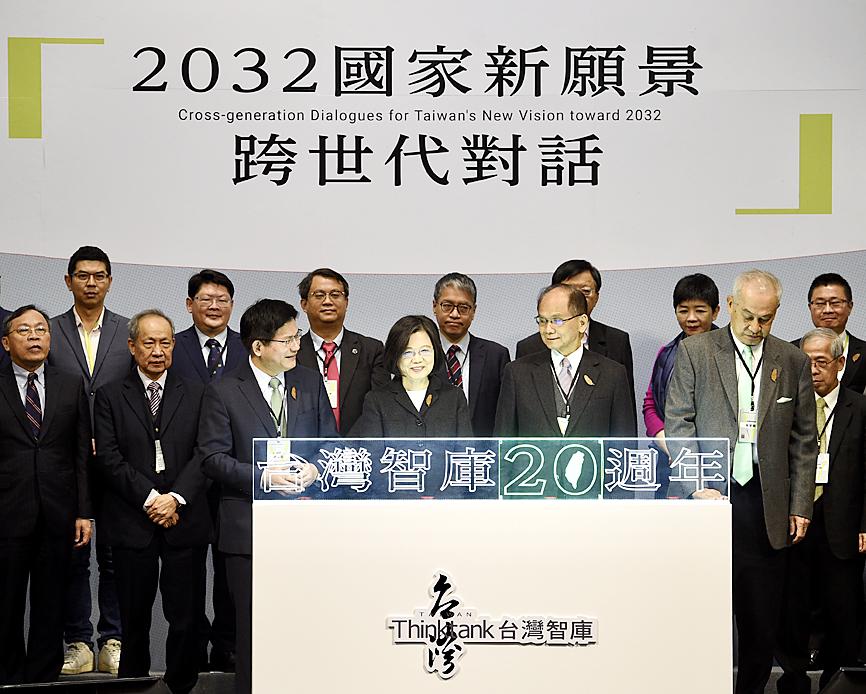Former minister of transportation and communications Lin Chia-lung (林佳龍) has reportedly been selected for the new position of ambassador-at-large for digital New Southbound Policy initiatives.
President Tsai Ing-wen (蔡英文) favors Lin for the role, which is to serve as a liaison between the government and private sector, a source said.
Administrative affairs would be handled by National Security Council advisory member Fu Don-cheng (傅棟成).

Photo: Peter Lo, Taipei Times
Lin’s office said that the former minister closely monistors the nation’s industrial development, although he at the moment is focusing on the Jan. 9 Taichung legislative by-election and did not comment further on the position.
Lin, who served as Taichung mayor from 2014 to 2018, stepped down as transportation minister in April following a deadly Taroko Express train crash earlier that month.
The government is looking to take advantage of Taiwan’s digital strengths to add momentum to its New Southbound Policy and open avenues for development, a source said.
Established shortly after Tsai took office in 2016, the policy aims to enhance ties with 18 countries in the Indo-Pacific region: Australia, Bangladesh, Bhutan, Brunei, Cambodia, India, Indonesia, Laos, Malaysia, Myanmar, Nepal, New Zealand, Pakistan, the Philippines, Singapore, Sri Lanka, Thailand and Vietnam.
At an industrial innovation summit last month in Taichung, Tsai held talks with academic and industrial partners.
She also reportedly spoke with Lin, who was attending in his capacity as honorary chairman of the hosting foundation.
Afterward, at an anniversary event for the Taiwan Thinktank, Lin reportedly advised Tsai on the development potential of integrating digital initiatives in the New Southbound Policy.
Centering Taiwan’s Indo-Pacific strategy around its digital strengths would not only expand the nation’s influence from the first island chain into the wider region, but also serve its larger growth and security interests, people familiar with the decision said.

‘DENIAL DEFENSE’: The US would increase its military presence with uncrewed ships, and submarines, while boosting defense in the Indo-Pacific, a Pete Hegseth memo said The US is reorienting its military strategy to focus primarily on deterring a potential Chinese invasion of Taiwan, a memo signed by US Secretary of Defense Pete Hegseth showed. The memo also called on Taiwan to increase its defense spending. The document, known as the “Interim National Defense Strategic Guidance,” was distributed this month and detailed the national defense plans of US President Donald Trump’s administration, an article in the Washington Post said on Saturday. It outlines how the US can prepare for a potential war with China and defend itself from threats in the “near abroad,” including Greenland and the Panama

The High Prosecutors’ Office yesterday withdrew an appeal against the acquittal of a former bank manager 22 years after his death, marking Taiwan’s first instance of prosecutors rendering posthumous justice to a wrongfully convicted defendant. Chu Ching-en (諸慶恩) — formerly a manager at the Taipei branch of BNP Paribas — was in 1999 accused by Weng Mao-chung (翁茂鍾), then-president of Chia Her Industrial Co, of forging a request for a fixed deposit of US$10 million by I-Hwa Industrial Co, a subsidiary of Chia Her, which was used as collateral. Chu was ruled not guilty in the first trial, but was found guilty

A wild live dugong was found in Taiwan for the first time in 88 years, after it was accidentally caught by a fisher’s net on Tuesday in Yilan County’s Fenniaolin (粉鳥林). This is the first sighting of the species in Taiwan since 1937, having already been considered “extinct” in the country and considered as “vulnerable” by the International Union for Conservation of Nature. A fisher surnamed Chen (陳) went to Fenniaolin to collect the fish in his netting, but instead caught a 3m long, 500kg dugong. The fisher released the animal back into the wild, not realizing it was an endangered species at

DEADLOCK: As the commission is unable to forum a quorum to review license renewal applications, the channel operators are not at fault and can air past their license date The National Communications Commission (NCC) yesterday said that the Public Television Service (PTS) and 36 other television and radio broadcasters could continue airing, despite the commission’s inability to meet a quorum to review their license renewal applications. The licenses of PTS and the other channels are set to expire between this month and June. The National Communications Commission Organization Act (國家通訊傳播委員會組織法) stipulates that the commission must meet the mandated quorum of four to hold a valid meeting. The seven-member commission currently has only three commissioners. “We have informed the channel operators of the progress we have made in reviewing their license renewal applications, and